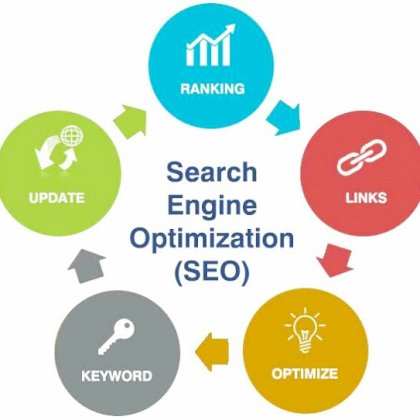What is Digital Marketing?Tips and Tricks for Effective Digital Marketing Campaigns

best digital marketing Digital marketing has become an essential aspect of any business's success in today's digital age. With the increasing reliance on the internet and technology, businesses need to utilize the best digital marketing strategies to stay ahead of the competition and reach their target audience effectively. The best digital marketing practices involve a combination of various techniques, including search engine optimization (SEO), social media marketing, content marketing, email marketing, and paid advertising. By implementing these strategies and staying updated with the latest trends and tools, businesses can enhance their online presence, build brand awareness, generate leads, and ultimately drive more conversions and sales. In this highly competitive digital landscape, investing in the best digital marketing strategies is crucial for businesses to stay relevant and thrive.
Digital marketing is a rapidly growing field in the world of business. In today's digital age, it has become essential for businesses to have a strong online presence in order to thrive and succeed. But what exactly is digital marketing and why is it so important?
Put simply, digital marketing is the promotion of products or services using digital technologies such as the internet, mobile phones, and other digital mediums. It encompasses various strategies and techniques, including search engine optimization (SEO), social media marketing, content marketing, email marketing, and more.
One of the key reasons why digital marketing is important is because it allows businesses to reach a wider audience. With billions of people using the internet every day, digital marketing provides a unique opportunity to connect with potential customers all around the world.
Furthermore, digital marketing offers a level playing field for businesses of all sizes. Unlike traditional marketing methods, which can be costly and time-consuming, digital marketing can be affordable and accessible to businesses of any size. This means that even small businesses and startups can compete with larger companies and increase their brand visibility.
Another major benefit of digital marketing is its ability to track and measure results. With the help of analytics tools, businesses can gain valuable insights into their marketing campaigns and make data-driven decisions. This allows for continuous improvement and optimization, leading to better results and higher return on investment.
Moreover, digital marketing enables businesses to engage and interact with their target audience in a more personalized and meaningful way. Through social media platforms and targeted advertising, businesses can tailor their messages and offers to specific demographics, interests, and behaviors, creating a more engaging and relevant experience for their customers.
In conclusion, digital marketing plays a crucial role in today's business landscape. It offers numerous advantages, including broader reach, affordability, measurability, and personalized engagement. By leveraging the power of digital marketing, businesses can strengthen their online presence, build brand awareness, and ultimately drive more traffic, leads, and sales. So, if you haven't already embraced digital marketing, now is the time to do so.
The Key Benefits of Digital Marketing
In today's digital age, businesses are constantly looking for new and effective ways to reach their target audience. Digital marketing has emerged as a powerful strategy that helps businesses connect with potential customers and promote their products or services. In this article, we will explore the key benefits of digital marketing and how it can revolutionize your business.
Increased Online Visibility
One of the significant advantages of digital marketing is that it offers businesses a chance to improve their online visibility. With the right digital marketing tactics, businesses can rank higher in search engine results pages (SERPs), making it easier for potential customers to find them. By utilizing search engine optimization (SEO) techniques, businesses can optimize their websites and content with relevant keywords, ensuring that they appear in relevant searches.
Furthermore, digital marketing allows businesses to leverage social media platforms like Facebook, Twitter, and Instagram. These platforms offer a massive user base, providing businesses with an opportunity to expand their brand awareness and connect with their target audience on a more personal level. By engaging with followers and posting valuable content, businesses can build a strong online presence and gain credibility in their industry.
Cost-Effective Marketing
Traditional marketing channels like print advertisements and television commercials can be costly and may not yield the desired results. On the other hand, digital marketing offers a cost-effective solution for businesses of all sizes. With digital marketing, businesses can allocate their budgets strategically and maximize their return on investment (ROI).
Whether it's through search engine marketing (SEM), email marketing, or social media advertising, digital marketing allows businesses to target specific audiences and measure the success of their campaigns in real-time. This level of precision and flexibility ensures that businesses are getting the most out of their marketing efforts without wasting resources.
Improved Customer Engagement and Interaction
Digital marketing enables businesses to engage with their customers in a more interactive and personalized way. Through social media platforms, businesses can respond to customer inquiries, address concerns, and build lasting relationships. Moreover, by sharing valuable content and insights, businesses can position themselves as industry leaders and trusted sources of information.
Additionally, email marketing campaigns allow businesses to reach their customers directly and provide them with personalized offers and updates. By segmenting their audience and tailoring their messages, businesses can achieve higher open rates, click-through rates, and ultimately drive conversions.
Enhanced Data Analysis and Insights
Digital marketing provides businesses with access to a wealth of data and analytics. Through various tools and platforms, businesses can track their website traffic, user behavior, conversion rates, and much more. This data allows businesses to gain valuable insights into their target audience, their preferences, and their purchasing patterns.
By analyzing this data, businesses can refine their marketing strategies, target their efforts more effectively, and make data-driven decisions. This level of data analysis and optimization is crucial for long-term success in the digital landscape.
Conclusion
When utilized correctly, digital marketing can bring numerous benefits to businesses of all sizes. From increased online visibility and cost-effective marketing to improved customer engagement and enhanced data analysis, digital marketing has become an indispensable tool for staying competitive in today's digital age. Embracing digital marketing allows businesses to connect with their target audience, drive meaningful interactions, and achieve their marketing goals efficiently.
How to Create a Winning Digital Marketing Strategy
Are you looking to take your digital marketing efforts to the next level? Creating a winning digital marketing strategy is essential for businesses looking to succeed in today's competitive online landscape. In this article, we will discuss the key steps you need to take to develop a successful digital marketing strategy that will drive results and help you achieve your business goals.
Define Your Objectives: The first step in creating a winning digital marketing strategy is to clearly define your objectives. What do you want to achieve with your digital marketing efforts? Are you looking to increase brand awareness, generate leads, or drive sales? By clearly stating your objectives, you can tailor your strategy to achieve these goals effectively.
Know Your Target Audience: In order to create an effective digital marketing strategy, you need to have a deep understanding of your target audience. Who are they? What are their needs and pain points? By knowing your audience, you can create highly targeted content and campaigns that will resonate with them and drive engagement.
Conduct Competitor Research: Analyzing your competition is a crucial step in developing a winning digital marketing strategy. By studying your competitors' online presence, you can identify gaps in the market, gain insights into successful strategies, and differentiate yourself from the competition.
Keyword Research: Keywords play a vital role in search engine optimization (SEO) and should be a central part of your digital marketing strategy. Conduct thorough keyword research to identify the relevant keywords and phrases that your target audience is searching for. By optimizing your content with these keywords, you can improve your website's visibility in search engine results and attract organic traffic.
| Step | Description |
|---|---|
| 1 | Define Your Objectives |
| 2 | Know Your Target Audience |
| 3 | Conduct Competitor Research |
| 4 | Keyword Research |
Create Engaging Content: Content is at the heart of any successful digital marketing strategy. Develop high-quality, valuable content that addresses your audience's needs and interests. This can be in the form of blog posts, videos, infographics, or social media posts. By consistently delivering valuable content, you can build trust with your audience and establish your brand as an authority in your industry.
Optimize Your Website: A well-optimized website is essential for a winning digital marketing strategy. Make sure your website is user-friendly, mobile-responsive, and loads quickly. Optimize your website's meta tags, headings, and content with relevant keywords to improve its visibility in search engine results and provide a seamless user experience.
Utilize Social Media: Social media platforms offer a powerful way to reach and engage with your target audience. Identify the social media platforms that your audience frequents and create a presence on those channels. Share your valuable content, interact with your audience, and leverage social media advertising to extend your reach and drive traffic to your website.
Analyze and Adjust: Regularly analyze the performance of your digital marketing efforts and make necessary adjustments. Use analytics tools to track website traffic, engagement, and conversion rates. This data will provide valuable insights into the effectiveness of your strategy and help you identify areas for improvement and optimization.
In conclusion, creating a winning digital marketing strategy requires careful planning, understanding your target audience, and implementing effective tactics. By following the steps outlined in this article and consistently delivering valuable content, optimizing your website, and leveraging social media, you can create a strategy that drives results and helps you achieve your business goals. Stay up to date with the latest SEO trends and adapt your strategy as needed to stay ahead of the competition.
Top Digital Marketing Trends to Watch in [current year]
As the digital landscape continues to evolve at a rapid pace, staying up to date with the latest trends is essential for any digital marketer. In [current year], there are several key trends that are expected to shape the future of digital marketing. Let's take a closer look at these trends and how they can impact your marketing efforts.
- Artificial Intelligence (AI) and Machine Learning: AI and machine learning are revolutionizing the way marketers analyze and interpret data. With AI-powered tools, marketers can gain valuable insights into customer behavior, personalize content, and optimize marketing campaigns. Expect to see more AI-driven solutions being integrated into marketing strategies in [current year].
- Voice Search Optimization: With the rise of smart speakers and virtual assistants, voice search is becoming increasingly popular. As a result, optimizing your website and content for voice search is crucial. Consider how users phrase their queries when speaking and incorporate long-tail conversational keywords into your content.
- Video Marketing: Video content continues to dominate the online space. From engaging social media videos to informative product demos, video marketing has proven to be highly effective in capturing audience attention. Incorporate video into your marketing strategy to stand out from the competition and connect with your target audience on a deeper level.
- Interactive Content: Engaging your audience is more important than ever, and interactive content is a great way to achieve that. Interactive quizzes, polls, and surveys allow users to actively participate and provide valuable data for your marketing efforts. Consider incorporating interactive elements into your website and social media to boost engagement and drive conversions.
- Mobile-first Approach: With the majority of online users browsing through their smartphones, a mobile-first approach to marketing is no longer optional. Ensure that your website is mobile-friendly, and optimize your content for mobile devices. This includes fast loading times, responsive design, and easy navigation.
Keep in mind that these trends are constantly evolving, and it's important to stay agile and adapt your marketing strategies accordingly. By staying ahead of the game and embracing these digital marketing trends, you can stay competitive in the online marketplace.
Understanding Different Digital Marketing Channels
In today's digital age, businesses must utilize a variety of marketing channels to effectively reach and engage with their target audience. Understanding the different digital marketing channels available can help businesses create a comprehensive marketing strategy that maximizes their online presence. In this article, we will explore the various digital marketing channels and their importance in the online landscape.
Search Engine Optimization (SEO)
Search Engine Optimization, or SEO, is a crucial aspect of digital marketing. It involves optimizing your website and its content to rank higher in search engine results pages (SERPs). By utilizing relevant keywords, creating high-quality content, and building backlinks, businesses can improve their organic visibility and generate more traffic to their website.
However, it's important to note that SEO is an ongoing process that requires continuous effort. Algorithms used by search engines frequently change, and businesses must stay updated with the latest best practices to maintain their rankings.
Pay-Per-Click (PPC) Advertising
PPC advertising allows businesses to place targeted ads on search engine results pages or other websites and pay only when the ad is clicked. This form of advertising can provide instant visibility and drive traffic to your website. Google AdWords and Bing Ads are popular platforms for running PPC campaigns.
When creating PPC ads, it's essential to conduct thorough keyword research and carefully craft ad copy that entices users to click. Continually monitoring and optimizing your PPC campaigns can help maximize your return on investment (ROI).
Social Media Marketing
Social media has become an integral part of people's lives, presenting businesses with a fantastic opportunity to connect and engage with their target audience. Platforms such as Facebook, Instagram, Twitter, and LinkedIn offer various advertising options, including sponsored posts, targeted ads, and influencer collaborations.
When creating social media marketing campaigns, it's crucial to understand your target audience and tailor your content accordingly. Consistently posting high-quality content that resonates with your audience can help build a loyal following and increase brand awareness.
Email Marketing
Email marketing allows businesses to communicate directly with their audience via email. It is a cost-effective and efficient way to nurture leads, build customer loyalty, and drive conversions. Creating personalized, engaging, and relevant email campaigns can effectively engage your subscribers and encourage action.
However, it's important to obtain explicit permission from subscribers and adhere to data protection regulations, such as the CAN-SPAM Act and the General Data Protection Regulation (GDPR).
Affiliate Marketing
Affiliate marketing is a performance-based marketing strategy in which affiliates earn a commission for driving traffic or sales to a business through their marketing efforts. By partnering with relevant influencers or bloggers, businesses can expand their reach and increase brand visibility.
When implementing an affiliate marketing program, it's crucial to carefully select affiliates who align with your brand values and target audience. Providing affiliates with the necessary resources and incentives can motivate them to promote your products or services effectively.
Content Marketing
Content marketing involves creating and distributing valuable and relevant content to attract and engage a target audience. This can take the form of blog posts, articles, videos, infographics, and more. By providing informative and engaging content, businesses can establish themselves as industry leaders and build trust with their audience.
When creating content, it's crucial to conduct keyword research and optimize your content for search engines. Utilizing relevant keywords, incorporating internal and external links, and providing valuable insights can help improve your content's visibility and drive organic traffic.
Conclusion
Understanding the different digital marketing channels available is crucial for businesses looking to establish a strong online presence. By utilizing a combination of SEO, PPC advertising, social media marketing, email marketing, affiliate marketing, and content marketing, businesses can effectively reach and engage with their target audience, ultimately driving brand awareness and increasing conversions.
Remember to stay up-to-date with the latest industry trends and adapt your marketing strategy accordingly. By focusing on providing value to your audience and following best practices, you can leverage the power of digital marketing channels to achieve remarkable results for your business.
| Channel | Description |
|---|---|
| Search Engine Optimization | Improving organic visibility in search engine results pages through keyword optimization and content quality. |
| Pay-Per-Click Advertising | Placing targeted ads on search engine results pages or other websites and paying per click. |
| Social Media Marketing | Engaging with target audience through various social media platforms to increase brand awareness. |
| Email Marketing | Communicating directly with audience via email to nurture leads and drive conversions. |
| Affiliate Marketing | Partnering with affiliates to promote products or services in exchange for commission. |
| Content Marketing | Creating and distributing valuable and relevant content to attract and engage target audience. |
In today's digital age, having a strong online presence is crucial for the success of any business or brand. With the ever-evolving world of digital marketing, it is important to stay updated with the latest tips and tricks to run effective campaigns. In this article, we will discuss some valuable insights to help you enhance your digital marketing strategies and achieve desired results.
1. Set Clear Goals and Objectives
Before diving into any digital marketing campaign, it is important to establish clear goals and objectives. What is it that you want to achieve? Is it increased website traffic, higher conversions, or brand visibility? Clearly defining your goals will help you create a focused and targeted campaign strategy.
2. Understand Your Target Audience
To create impactful digital marketing campaigns, it is essential to understand your target audience. Research and analyze their preferences, behavior patterns, and demographics. This knowledge will enable you to tailor your content and marketing tactics to appeal to your audience, increasing the chances of engagement and conversion.
3. Utilize Search Engine Optimization (SEO)
SEO plays a crucial role in improving your website's visibility and driving organic traffic. Make sure to use relevant keywords, optimize your meta tags, and create high-quality content that resonates with both search engines and your audience. Implementing SEO best practices will help your website rank higher in search engine results, increasing the chances of attracting organic traffic.
4. Leverage Social Media Platforms
With billions of active users, social media platforms provide excellent opportunities for businesses to connect with their target audience. Develop a strong presence on platforms where your audience is most active and engage with them through compelling content, giveaways, contests, and promotions. This will not only increase brand awareness but also drive traffic to your website.
5. Invest in Pay-Per-Click (PPC) Advertising
PPC advertising allows you to reach a wider audience by placing targeted ads on search engine result pages and social media platforms. Allocate a budget for PPC campaigns and ensure your ads are compelling, relevant, and optimized to attract potential customers. Monitor and analyze your campaign performance regularly to make necessary adjustments and optimize your ROI.
6. Utilize Email Marketing
Email marketing remains one of the most effective digital marketing tools. Build an email list of subscribers who have shown interest in your brand or products and engage with them through personalized, valuable content. Send regular newsletters, exclusive offers, and updates to nurture customer relationships and drive conversions.
7. Monitor and Analyze Metrics
To measure the success of your digital marketing campaigns, it is important to track and analyze relevant metrics. Monitor website traffic, conversion rates, click-through rates, and other key performance indicators. Use analytics tools to gain insights into your audience's behavior and preferences, enabling you to refine your strategies and achieve better results. In conclusion, implementing these tips and tricks will help you create effective digital marketing campaigns that drive results. Remember to stay updated with the latest trends and continuously refine your strategies to stay ahead in the dynamic world of digital marketing.
Essential Tools for Successful Digital Marketing
Digital marketing is a rapidly growing field that requires businesses to stay ahead of the competition. In order to achieve success in this fast-paced industry, it is essential to utilize the right tools. In this article, we will explore some of the most important tools that can help businesses thrive in the world of digital marketing. 1. Search Engine Optimization (SEO) Tools: SEO is crucial for driving organic traffic to your website. To ensure that your website appears in search engine results, you need to optimize your content and web pages. There are several SEO tools available that can help you with keyword research, on-page optimization, and tracking your website's performance. Some popular SEO tools include Moz, SEMrush, and Ahrefs. 2. Social Media Management Tools: Social media platforms play a significant role in digital marketing. They provide businesses with an opportunity to engage with their target audience and build brand awareness. To effectively manage your social media presence, you can use tools like Hootsuite, Buffer, and Sprout Social. These tools allow you to schedule posts, track engagement metrics, and monitor your social media accounts from a single dashboard. 3. Content Creation and Management Tools: Creating high-quality content is essential for attracting and engaging your target audience. Content creation tools like Grammarly can help you improve your writing and ensure that your content is free from errors. Additionally, content management systems like WordPress can assist you in organizing and publishing your content effectively. 4. Email Marketing Tools: Email marketing is still one of the most effective ways to reach out to your audience and nurture leads. Tools like Mailchimp, Constant Contact, and ConvertKit can help you create visually appealing email campaigns, segment your subscribers, and track the performance of your emails. 5. Analytics Tools: In order to measure the success of your digital marketing efforts, it is important to track and analyze your website's performance. Google Analytics is a widely used tool that provides valuable insights into your website's traffic, user behavior, and conversion rates. Other analytics tools like Kissmetrics and Mixpanel can provide more advanced data analysis and tracking features. 6. Conversion Optimization Tools: Converting website visitors into customers is the ultimate goal of digital marketing. Conversion optimization tools like Optimizely and Crazy Egg can help you test different elements of your website, such as headlines, call-to-action buttons, and forms, to identify the most effective variations that drive conversions. In conclusion, the right tools can make a significant difference in the success of your digital marketing efforts. By utilizing SEO tools, social media management tools, content creation and management tools, email marketing tools, analytics tools, and conversion optimization tools, you can stay ahead of the competition and achieve your digital marketing goals. Start incorporating these essential tools into your digital marketing strategy today and watch your business thrive in the online world.
Measuring Success: Key Metrics for Evaluating Digital Marketing Efforts
In today's digital age, measuring the success of your marketing efforts is crucial. With so many digital channels and strategies available, it's important to identify the key metrics that can help you evaluate your digital marketing campaigns effectively. These metrics not only provide valuable insights into your performance but also help you make data-driven decisions to optimize your strategies and drive better results.
Here are some key metrics you should consider when evaluating your digital marketing efforts:
1. Website Traffic
Website traffic is a fundamental metric in evaluating your digital marketing efforts. It measures the number of visitors coming to your website. By analyzing your website traffic, you can understand the effectiveness of your marketing channels, identify trends, and make informed decisions to increase traffic and engagement.
2. Conversion Rate
Your conversion rate measures the percentage of visitors who take the desired action on your website, such as making a purchase, filling out a form, or subscribing to a newsletter. This metric indicates the effectiveness of your website in converting visitors into customers or leads. By optimizing your conversion rate, you can improve your marketing ROI and generate more valuable leads.
3. Cost per Lead (CPL)
Cost per lead (CPL) is the amount you spend on acquiring a single lead through your digital marketing efforts. By calculating your CPL, you can assess the efficiency of your campaigns and compare it with the value of each lead. This metric helps you allocate your marketing budget wisely and optimize your lead generation strategies.
4. Return on Investment (ROI)
Return on investment (ROI) is a crucial metric that measures the profitability of your digital marketing campaigns. It compares the revenue generated from your marketing efforts with the cost invested. A positive ROI indicates that your campaigns are generating more revenue than the cost incurred. By tracking your ROI, you can identify the most effective marketing channels and strategies and allocate your resources accordingly.
5. Customer Lifetime Value (CLTV)
Customer lifetime value (CLTV) measures the total revenue a customer generates throughout their relationship with your business. This metric helps you understand the long-term value of your customers and identify opportunities for customer retention and upselling. By improving your CLTV, you can maximize your revenue and build strong, lasting relationships with your customers.
Measuring the success of your digital marketing efforts is essential for driving continuous improvement and achieving your marketing goals. By focusing on these key metrics and making data-driven decisions, you can optimize your strategies, allocate your resources effectively, and ultimately drive better results for your business.
Frequently Asked Questions
Digital marketing refers to the use of digital channels and technologies to promote products or services online. It encompasses various strategies such as search engine optimization (SEO), social media marketing, email marketing, content marketing, and more.
Digital marketing is important because it allows businesses to reach a wider audience, generate more leads, increase brand awareness, and drive sales. It provides the potential for targeted marketing campaigns and a measurable return on investment (ROI).
The key components of a digital marketing strategy include defining target audience, setting clear goals and objectives, selecting relevant digital channels, creating compelling content, optimizing for search engines, engaging on social media, tracking metrics, and continuously improving the strategy based on data analysis.
The time it takes to see results from digital marketing efforts can vary depending on various factors such as the industry, competition, target audience, and marketing tactics used. Generally, it can take a few months to start seeing significant results, but ongoing efforts and optimization are required for long-term success.
Search engine optimization (SEO) is the process of optimizing a website to improve its visibility and ranking on search engine results pages (SERPs). It involves various techniques such as keyword research, on-page optimization, technical SEO, link building, and content creation.
Social media marketing involves using social media platforms to promote products or services. It includes activities such as creating and sharing engaging content, interacting with followers, running paid advertising campaigns, and analyzing social media metrics.
Content marketing is a strategic marketing approach focused on creating and distributing valuable, relevant, and consistent content to attract and retain a clearly defined audience. It includes various formats such as blog posts, articles, videos, infographics, and more.
Email marketing can be effective in digital marketing by allowing businesses to directly communicate with their target audience. It is an effective way to nurture leads, promote products or services, drive traffic to websites, and build customer loyalty. Personalization, automation, and segmentation are important aspects of successful email marketing campaigns.
The cost of digital marketing can vary depending on factors such as the scope and complexity of the campaign, target audience, competition, and chosen digital channels. It can range from a few hundred dollars for small-scale campaigns to thousands or even millions of dollars for large-scale campaigns.
The success of digital marketing efforts can be measured using various metrics such as website traffic, conversion rates, click-through rates, social media engagement, email open rates, ROI, and more. Analytics tools and tracking platforms provide valuable insights to assess the effectiveness of campaigns and make data-driven decisions.
 English
English
 Turkish
Turkish 























